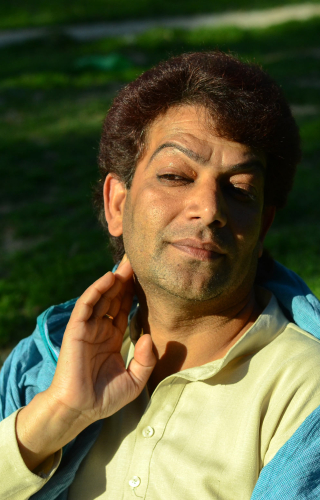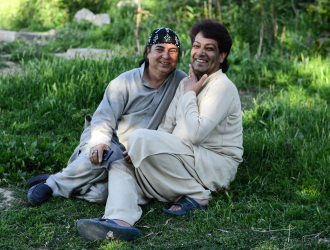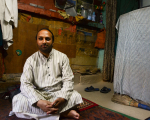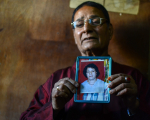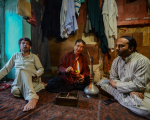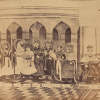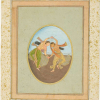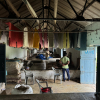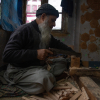‘Zinda jala denge!’ (They will burn us alive), exclaimed Simran when I asked her why she was not wearing her long hair out or applying the fuchsia lipstick she had in her handbag. We were at a maenziraat (ceremonial bath followed by a mehndi ceremony) and she was there to facilitate the celebratory bach-e-nagmeh (ceremonial folk song and dance) as is customary in many Kashmiri families during a wedding.
She sipped the nun chai (salted tea) loudly, took a deep breath and explained that many transwomen in Kashmir choose to refrain from feminine make-up in public as transgressing the rigid heteronormative norms can have serious repercussions. ‘Some of them do it, I haven’t mustered the courage yet. I don’t want to be taunted as a lanczh’ she added. Lanczh is a derogatory term used to refer to transwomen in Kashmir, implying impotence or powerlessness.
Simran is part of the transgender community in Kashmir that lives a near invisible existence. Though back in 2014, the Supreme Court recognised transgender people as the ‘third gender’ and affirmed that the social, political and cultural rights guaranteed by the Constitution apply to them as well, very little has changed for them on the ground. However, a social revolution of sorts led by an activist, an NGO and the LGBT community to assert their right to dignity, honour, equality and freedom is taking shape in the Valley.
—
Most transgender people in Kashmir are menzimyeors (matchmakers) or singers and dancers at weddings, the only job they are ‘allowed’ to take up. Some of them have earned huge fame and recognition as singers; the ‘world famous’ Reshma, for instance. When I asked the receptionist of the hotel I’m staying in to give me directions to Nava Kadal (an area in Old Srinagar) and mentioned that I’m off to meet Reshma, he was overjoyed. ‘You are meeting world famous Reshma, wow! How lucky!’ He immediately played her famous song ‘Hay hay waisyee yaaran hy tadpavnas’ on YouTube and started dancing to it. Over the years, she has gained a reputation of being one of the most entertaining singers in Kashmir. She is a sensation on social media, with her videos crossing two million likes on YouTube. She is also an idol and a pillar of strength for her family and the larger transgender community in Kashmir.
Reshma exudes warmth, compassion and fortitude; maybe her turbulent life journey has helped her build a calm resilience. During her growing up years, she was constantly humiliated for her effeminate demeanour. She is an idol and a pillar of strength for her family and the larger transgender community in Kashmir. Since her parent's didn’t understand what it means for a boy child to want to be a girl, they assumed she is ‘eccentric’. She was not allowed to learn or perform music, a talent that she recognised early in her teens, as it was considered a feminine pursuit.Therefore, she had to learn tailoring and suppress her desire to embrace the feminine identity. But when her older brother passed away and all the other brothers walked away refusing to support the family, she took to music and became the sole breadwinner.
The soft-spoken, calm Reshma transforms into a completely different person when she starts singing. Watching her perform is a delight, even though the language is unfamiliar. Her Punjabi rendition of ‘Baag aya sayyan’ has the crowd going zany. Her dramatic mimicking of songs from Ladakh, Bihar and even America has people laughing, screaming and dancing joyously. ‘She is a phenomenon,’ quips the new bride, thoroughly enjoying the celebrations at her mehandi ceremony.
But life isn’t easy for Reshma. She tells me that many Kashmiris are opting for ‘I love you’ (love marriage) these days, so there is not much scope for matchmaking. Once upon a time all Kashmiri family weddings had a transwoman perform. ‘Girls and boys have entered the business, so more than 90 per cent of the work is taken over by them,’ she said, and suggested I watch the video of Valley Boys, a new breed of wedding singers.
Though Reshma is a role model of sorts for the community and has been able to garner a lot of respect, there are times even she is exploited. Either the pay is dismal, or people refuse to pay after the wedding performance is over. ‘You learn to live with humiliation. If this is my story, imagine what the others go through.’ She also tells me that there is a section of them who resort to sex work, but that’s a small percentage of the population.
—
‘No one cares about the minorities. When your parents and immediate family members don’t try to understand you, what can we expect from the society? Let’s not even talk about the eccentricities of Kashmiri siyasat (politics),’ said Shabnam Subhan, tired of fighting marginalisation for decades. She had left her home in Sopore about 25 years ago. Her family wasn’t happy with her feminine mannerisms and constantly nagged her to ‘be a man’. She had to drop out of school by 5th grade, troubled by the constant hooting, mockery and name-calling. She was physically harassed at home; her brother broke her arm and locked her up in a room for days. They even got her arrested for ten days on fake charges of helping militants. She was eventually thrown out of her house when none of their controlling measures could ‘cure’ her femininity. She moved to Srinagar, got together with the transgender community and took up singing to survive.
She went through dupteh traawun, a traditional ceremony one must be a part of to be accepted as a benih (sister) in a transgender family. Though nirvana (ritual involving castration of male genitals for transwomen followed in other parts of the country) isn’t practiced in Kashmir, most of them become part of transgender families through the ritualistic practices. Sether thaawun is another ritual one has to go through to be initiated as a koor (daughter or chela) to the naien (grandmother or guru).
—
The narratives of most transgender people seem similar as they live in a perpetual state of identity crisis. Apart from the gender identity, the conflict has had a huge influence on their life choices as well. ‘Conflict is a masculine movement, an expression and reinforcement of power. Not just women, transgender people too have been systematically denied their personhood and agency,’ said Aijaz Ahmed Bund, the lone LGBT activist and military feminist (as he likes to be called), who runs an NGO, Sonzal Trust, to support the gender and sexual minorities in Kashmir.
He published the first ethnographic study about the community in his book Hijras in Kashmir: A Marginalized Form of Personhood in 2017 that pushed the Kashmir government to take a serious look at the community’s living conditions, for the first time.
While the transgender community has existed for centuries, historical accounts have purposely ignored them. ‘The hijras enjoyed many privileges during the Mughal period, as they were employed as guards for women and children in the harem. But the British thrust their ideologies of sex-gender binaries and heteronormative sexuality perspectives. The hijra body was a problem because it wasn’t the abled procreative-heterosexual body. They were criminalised under the Criminal Tribes Act, 1871, which deemed the entire community of hijras as innately 'criminal',’ Aijaz added. While recent studies and social media campaigns have piqued the interest of media and thus other stakeholders, it has had a negative impact too.
When I met Pinky at her modest one-bedroom house, she was furious. She spent the first one hour ridiculing the ‘media’. She saw no point in talking to me about her life, especially the one as a transgender model in Mumbai; a life choice she now regrets.
‘Will your photograph put food on the table? Are people going to change the way they look at us?’ she asked, and rightly so. As I sat there calmly listening to her and held the space for her to vent out, she began to warm up. When Tahira, another transwoman, walked into the house, she got chattier.
She proudly showed off photographs from her modelling days back in Mumbai but quickly added that she would soon burn them up. ‘Islam doesn’t allow this, it’s haram,’ she said. As we talked, she went back and forth, initially experiencing a nostalgic joy as she looked at the pictures of her life in Mumbai but later guilty about the ‘indulgence’. Tahira begun to speak about the harassment they face on an everyday basis, but Pinky interrupted, ‘Kashmiris are very nice people, they let us be. Don’t malign them, especially in front of an outsider.’
It seemed to me that the intersection of three unique identities—that of being a Kashmiri, a transgender person and a Muslim—has created a unique, multi-layered and complex selfdom. Aijaz explained, ‘Well, they depend on Kashmiris for their jobs, for the opportunity to sing in the weddings. She can’t speak ill of them, can she? People oppress the trans community in the name of religion and misinterpret the Quran. In fact, transgender people are mentioned in the Quran in Surah Al Shura verse 49–50. In the end, everything is politicised in Kashmir. Islam too.’ Aijaz is constantly targeted too, for voicing his opinions on gender and sexual minorities. He is threatened, blackmailed, abused and trolled on social media for being a ‘Zionist’ and having a ‘Western’ agenda.
—
I met Muktiyar at another wedding function. She was waiting to perform the traditional dance, right after dinner. The feast was served for all guests in a treame, a big plate where four people share their food. The wazwan (Kashmiri wedding feast) was served. While people started sharing the food, Muktiyar didn’t have anyone join her. ‘This says enough about what people think of us. Respect is a rare commodity for us,’ she said and went on to talk about Nadeem, a friend she used to live with. When Nadeem died they couldn’t even find a graveyard for her. For transgender people, traditional graveyards in Kashmir aren’t accessible, either because of the cost or lack of space. Since most trans people are separated from their families, there is no one to buy burial lands for them. When ‘Mama’, a transwoman died at the age of 90, her body was not allowed to be buried in the mohalla graveyard because people believed that her soul will bring trouble for other dead in the graveyard. Eventually her friends pooled money to purchase a land in the periphery and buried her there.
‘Did you hear about this dog that feasted on a transwoman’s dead body on the road? For all you know I will be dead, and no one will know for weeks. Who will even bother about burying me when I’m gone?’ asked Nissar, an older transwoman who lives in a crumbling one-room house on the second floor. Most of the days, there is no water or electricity. ‘I can’t move my body anymore. How will I make money from singing or dancing? Who will support me? I can’t blame my community either, they are trying hard to make ends meet. My youth wasn’t easy either. People shamed and spit on us back in those days. Back in the 90s, a few army men stopped us and made us dance in front of 10,000 people. No one could stop them.’
Two decades later, things are beginning to change. For the first time in history, the J&K Assembly took notice of the community’s plight last year. The annual budget included welfare measures for transgender people, and has categorised them as people below poverty line. The government promised free life and medical insurance as well as a monthly sustenance pension for those aged 60 and above for those registered with the Social Welfare Department.
While this move needs to be appreciated, what seems contentious is the need for a ‘medical board’ to determine a person’s gender and issue a ‘transgender certificate’. The boards would consist of the district social welfare officer, a social worker, two representatives of the transgender community as well as psychologists and psychiatrists. This proposal to establish medical boards for gender certificates has been criticised by the community as a regressive idea that tries to fit gender into a biological construct.
‘How insensitive is that? Do we ask men and women to go to medical boards, so why us? Do you think any man or woman would willingly go through the ordeals of a transgender life, just to get the measly benefits?’ asked Babloo, a leader of sorts for the community in Srinagar. Babloo is one of these few transgender people who live with their family. ‘They accepted and supported me till now but I’m not sure how things will be when my brother gets married and brings home a wife. People hardly seem to understand what it means to be a transperson. They think we are ‘mental’, isn’t that why they need psychiatrists on the medical boards? In 1992, during crackdown, the army took me to a BSF officer and he slapped me hard for just being me. I could do nothing! Even in places of worship we are shunned. I cleaned a mosque and people refused to pray there because I am a transperson. They seem to believe that we will curse them and so shun us away. If only we had such powers!’
Like Babloo, Shafiq’s family, too, has accepted her. She lives with her parents and three brothers. Her sister is married and often comes home with her son to visit. Apart from the weddings, she also dances in khutna (circumcision) ceremonies. She also makes papier mache craft items to earn a livelihood. She is happy, maybe the regular visit to the pir helps. She is looking forward to going to Hajj and give up everything, when she grows older. When I asked her age, she said, ‘I’m teenaged. Only 30 years.’
But such stories of acceptance by family members is rare. Shuja (name changed), a transwoman, used to get her night’s sleep in Masjids, having been thrown out of her house for supposedly bringing on bad omens. She was abducted from the mosque and raped. When she tried to file a complaint the police only asked, ‘How can a lanczh be raped?’
Either the larger community is ignorant of gender dysphoria or assume it’s a mental issue that needs treatment. The constant humiliation, sexual violence and discrimination leads to severe mental health issues. According to psychiatrist Dr Arshad Hussain, ‘Mental health is a serious concern in Kashmir. The transgender community succumbs to a variety of psychological issues like panic disorder, post-traumatic stress disorders depression, obsessive compulsive disorder and suicidal tendencies.’ Healthcare, both physical and mental, continues to be a challenge for the community as many doctors have a transphobic outlook.
—
Recent legal measures, however, are paving the way for a better future. Transgender people were recognised as ‘third gender’ in 2014, and section 377 of Indian Penal Code (IPC), which criminalises homosexuality, has been finally scrapped in September 2018. There was an initial confusion about the applicability of the SC judgment on section 377 in Jammu and Kashmir, given they fall under the Ranbir Penal Code. But it has been cleared that the judgement around section 377 of the IPC is applicable to the entire country.
The trans community in Kashmir is overjoyed. ‘What a relief to know that you don’t have a criminal tag in your own country. We have taken the first step to humanise them, now a lot of work at the grassroot level needs to be done,’ remarked Bund. An interim judgement for the PIL raised by Aijaz has been positive too. A division bench of Chief Justice Gita Mittal and Justice Alok Aradhe has directed the government to carry out the census so that welfare measures for transgenders can be framed objectively.
A welfare policy for the transgender community, which takes on an integrated approach at the institutional as well as political levels will help end the oppression, moral exclusion and harassment they face. What now remains is the herculean task of sensitising the people in the Valley towards the transgender community.
